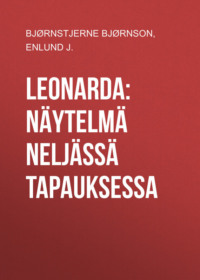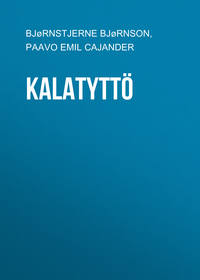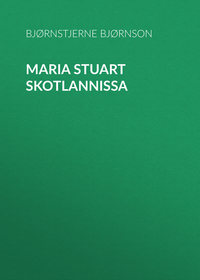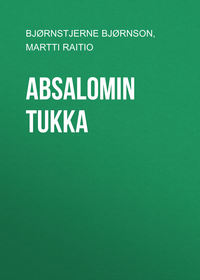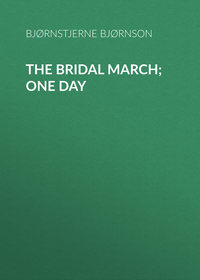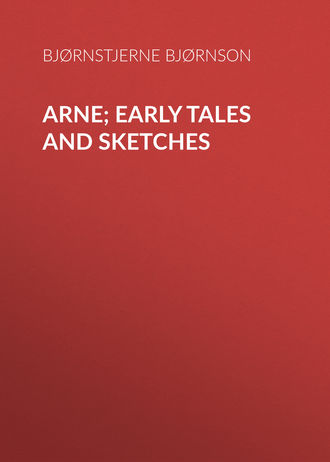 полная версия
полная версияArne; Early Tales and Sketches
"Then one day, as he stood chopping wood, there came a girl through the yard who actually looked like the hulder. But when she came nearer, it was not she. He thought much about this; then the girl came back, and in the distance it was the hulder, and he ran directly toward her. But the moment he came near her it was not she.
"After this, let the youth be at church, at a dance, at other social gatherings, or where he would, the girl was there too; when he was far from her, she seemed to be the hulder; near to her, she seemed to be another; he asked her then whether it were she or not; but she laughed at him. It is just as well to spring into it as to creep into it, thought the youth, and so he married the girl.
"No sooner was this done than the youth ceased to like the girl. Away from her, he longed for her; but when with her, he longed for one he did not see; therefore he was harsh toward his wife; she bore this and was silent.
"But one day, when he was searching for the horses, he found his way to the crag, and sitting down, he called out, —
'Like fairy moonlight to me thou seemest,Like midsummer fires from afar thou gleamest.'"He thought it did him good to sit there, and he fell into the way of going thither whenever anything went amiss at home. The wife wept when she was left alone.
"But one day, while the youth was sitting on the crag, the hulder, her living self, appeared on the opposite side, and blew her horn. He eagerly cried, —
'Ah, dear, art thou come! all around thee is shining!Ah, blow now again! I am sitting here pining.'"Then she answered, —
'Away from thy mind the dreams I am blowing, —The rye is all rotting for want of mowing.'"But the youth was frightened, and went home again. Before long, though, he was so tired of his wife that he felt compelled to wander off to the wood and take his seat on the crag. Then a voice sang, —
'I dreamed thou wast here; ho, hasten to bind me!No, not over there, but behind you will find me.'20"The youth started up, looked about him, and espied a green skirt disappearing through the woods. He pursued. Now there was a chase through the woods. As fleet of foot as the hulder was, no mortal could be; he cast steel21 over her again and again; she ran on the same as before. By and by she began to grow tired. The youth knew this from her foot-fall, though her form convinced him that it was the hulder herself, and none other. 'You shall surely be mine now,' thought the youth, and suddenly flung his arms about her with such force that both he and she rolled far down the hill before they could stop. Then the hulder laughed until the youth thought the mountains fairly rang; he took her on his knee, and she looked so fair, just as he had once thought his wife would look.
"'Oh, dear, who are you that are so fair?' asked the youth, and as he caressed her, he felt that her cheeks were warm and glowing.
"'Why, good gracious, I am your wife,' said she."
The girls laughed, and thought the youth was very foolish. But godfather asked Arne if he had been listening.
"Well, now, I will tell you something," said a little girl, with a little round face, and such a very little nose.
"There was a little youth who wanted very much to woo a little maiden; they were both grown up, yet were both very small indeed. But the youth could not muster up courage enough to begin his wooing. He always joined her after church, but they did not then get beyond the weather in their talk; he sought her at the dances, and he danced her almost to death, but talk with her he could not. 'You must learn to write, and then you will not have to,' said he to himself, and so the youth took to writing; but he never thought he could do well enough, and so he wrote a whole year before he dared think of a letter. Then the trouble was how to deliver it so that no one should see, and he waited until once they chanced to meet alone behind the church.
"'I have a letter for you,' said the youth.
"'But I cannot read writing,' answered the maiden.
"And the youth got no further.
"Then he took service at her father's house, and hung round her the whole day long. Once he came very near speaking to her; he had already opened his mouth, when there flew into it a large fly. 'If only no one comes and takes her from me,' thought the youth. But there came no one to take her from him, because she was so small.
"Some one did come along, though, at last, for he was small too. The youth well knew what he was after, and when he and the girl went up-stairs together, the youth made his way to the key-hole. Now he who was within offered himself. 'Alas, dunce that I am, not to have made more haste!' thought the youth. He who was inside kissed the girl right on the lips. 'That must have tasted good,' thought the youth. But he who was inside had drawn the girl down on his knee. 'What a world we live in!' said the youth, and wept. This the girl heard, and went to the door.
"'What do you want of me, you ugly boy, that you never give me any peace?'
"'I? – I only wanted to ask you if I might be your groomsman.'
"'No; my brothers are to be the groomsmen,' answered the girl, – and slammed the door in his face.
"And the youth got no further."
The girls laughed a great deal at this story, and sent a shower of husks flying round after it.
Godfather now wanted Eli Böen to tell something.
What should it be?
Why, she might tell what she had told over on the hill, when he was with them, the time she gave him the new garters. It was a good while before Eli was ready, for she laughed so hard, but at last she told: —
"A girl and a boy were walking together on the same road. 'Why, see the thrush that is following us,' said the girl. 'It is I whom it is following,' said the boy. 'It is just as likely to be me,' answered the girl. 'That we can soon see,' remarked the boy; 'now you take the lower road, and I will take the upper one, and we will meet at the top of the hill.' They did so. 'Was it not following me?' asked the boy, when they met. 'No, it was following me,' answered the girl. 'Then there must be two.' They walked together again a little way, but then there was only one thrush; the boy thought it flew on his side; but the girl thought it flew on hers. 'The deuce! I'll not bother my head any more about that thrush,' said the boy. 'Nor I either,' replied the girl.
"But no sooner had they said this than the thrush was gone. 'It was on your side,' said the boy. 'No, I thank you; I saw plainly it was on yours. But there! There it comes again!' called out the girl. 'Yes, it is on my side!' cried the boy. But now the girl became angry. 'May all the plagues take me if I walk with you any longer!' and she went her own way. Then the thrush left the boy, and the way became so tedious that he began to call out. She answered. 'Is the thrush with you?' shouted the boy. 'No, it is with you.' 'Oh, dear! You must come here again, then perhaps it will come too.' And the girl came again; they took each other by the hand and walked together. 'Kvit, kvit, kvit, kvit!' was heard on the girl's side. 'Kvit, kvit, kvit, kvit!' was heard on the boy's side. 'Kvit, kvit, kvit, kvit, kvit, kvit, kvit, kvit!' was heard on both sides, and when they came to look, there were a thousand million thrushes round about them. 'Why, how strange!' said the girl, and looked up at the boy. 'Bless you!' said the boy, and caressed the girl."
This story all the girls thought fine.
Then godfather suggested that they should tell what they had dreamed the night before, and he would decide who had had the finest dream.
What! tell their dreams? No, indeed! And there was no end to the laughing and whispering. But then one after another began to remark that she had had such a fine dream last night; others, again, that, fine as the ones they had had, it could not by any means be. And finally, they all were seized with a desire to tell their dreams. But it must not be out loud, it must only be to one, and that must by no means be godfather. Arne was sitting quietly on the hill, and so he was the one to whom they dared tell their dreams.
Arne took a seat beneath a hazel, and then she who had told the first story came to him. She thought a long time, and then told as follows: —
"I dreamed I stood by a great lake. Then I saw some one go on the water, and it was one whom I will not name. He climbed up in a large pond-lily, and sat and sang. But I went out on one of those large leaves that the pond-lily has, and which lie and float; on it I wanted to row over to him. But no sooner had I stepped on the leaf than it began to sink with me, and I grew much alarmed and cried. Then he came rowing over to me in the pond-lily, lifted me up to where he sat, and we rowed all over the lake. Was not that a nice dream?"
The little maiden who had told the little story now came.
"I dreamed I had caught a little bird, and I was so happy that I did not want to let it go until I got home. But there I did not dare let go of it, lest father and mother should tell me I must let it out again. So I went up in the garret with it, but there the cat was lurking, and so I could not let go of it there either. Then I did not know what to do, so I took it up in the hay-loft; but, good gracious! there were so many cracks there that it could easily fly away! Well, then I went out in the yard again, and there I thought stood one whom I will not name. He was playing with a large, black dog. 'I would rather play with that bird of yours,' said he, and came close up to me. But I thought I started to run, and he and the large dog after me, and thus I ran all round the yard; but then mother opened the front door, drew me quickly in, and slammed the door. Outside, the boy stood laughing, with his face against the window-pane. 'See, here is the bird!' said he, – and, just think, he really had the bird! Was not that a funny dream?"
Then she came who had told about all the thrushes, – Eli they had called her. It was the Eli he had seen that evening in the boat and in the water. She was the same and yet not the same, so grown-up and pretty she looked as she sat there, with her delicately cut face and slender form. She laughed immoderately, and therefore it was long before she could control herself; but then she told as follows: —
"I had been feeling so glad that I was coming to the nutting-party to-day that I dreamed last night I was sitting here on the hill. The sun shone brightly, and I had a whole lapful of nuts. But then there came a little squirrel, right in among the nuts, and it sat on its hind legs in my lap and ate them all up. Was not that a funny dream?"
Yet other dreams were told Arne, and then he was to decide which was the finest. He had to take a long time to consider, and meanwhile godfather started off with the whole crowd for the gard, and Arne was to follow. They sprang down the hill, formed in a row when they had reached the plain, and sang all the way to the house.
Arne still sat there listening to the singing. The sun fell directly on the group, it shone on their white sleeves; soon they twined their arms about each other's waists; they went dancing across the meadow, godfather after them with his cane, because they were treading down his grass. Arne thought no more about the dreams. Soon he even left off watching the girls; his thoughts wandered far beyond the valley, as did the fine sunbeams, and he sat alone there on the hill and spun. Before he was aware of it, he was entangled in a close web of melancholy; he yearned to break away, and never in the world before so ardently as now. He faithfully promised himself that when he got home he would talk with his mother, come of it what would.
His thoughts grew stronger, and drifted into the song, —
"Over the lofty mountains."Words had never flowed so readily as now, nor had they ever blended so surely into verse, – they almost seemed like girls sitting around on a hill. He had a scrap of paper about him and placing it on his knee, he wrote. When the song was complete, he arose, like one who was released, felt that he could not see people, and took the forest road home, although he knew that the night, too, would be needed for this. The first time he sat down to rest on the way, he felt for the song, that he might sing it aloud as he went along, and let it be borne all over the parish; but he found he had left it in the place where it was written.
One of the girls went up the hill to look for him, did not find him, but found his song.
CHAPTER X
To talk with the mother was more easily thought than done. Arne alluded to Kristian and the letter that never came; but the mother went away from him, and for whole days after he thought her eyes looked red. He had also another indication of her feelings, and that was that she prepared unusually good meals for him.
He had to go up in the woods to fetch an armful of fuel one day; the road led through the forest, and just where he was to do his chopping was the place where people went to pick whortleberries in the autumn. He had put down his axe in order to take off his jacket, and was just about beginning, when two girls came walking along with berry pails. It was his wont to hide himself rather than meet girls, and so he did now.
"O dear, O dear! What a lot of berries! Eli, Eli!"
"Yes, dear, I see them."
"Well, then, do not go any farther; here are many pailfuls!"
"I thought there was a rustling in that bush over there!"
"Oh, you must be mad!" and the girls rushed at each other, and put their arms about each other's waists. They stood for a long while so still, that they scarcely breathed.
"It is surely nothing; let us go on picking!"
"Yes, I really think we will."
And so they began to gather berries.
"It was very kind of you, Eli, to come over to the parsonage to-day. Have you anything to tell me?"
"I have been at godfather's."
"Yes, you told me that; but have you nothing about him, – you know who?"
"Oh, yes!"
"Oh, oh! Eli, is that so? Make haste; tell me!"
"He has been there again!"
"Oh, nonsense!"
"Yes, indeed; both father and mother pretended they did not see it, but I went up in the garret and hid."
"More, more! Did he follow you there?"
"I think father told him where I was; he is always so provoking."
"And so he came? Sit down, sit down here beside me. Well, so he came?"
"Yes; but he did not say much, for he was so bashful."
"Every word! Do you hear? every word!"
"'Are you afraid of me?' said he. 'Why should I be afraid?' said I. 'You know what it is I want of you,' said he, and sat down on the chest beside me."
"Beside you!"
"And then he put his arm round my waist."
"His arm round your waist? Are you wild?"
"I wanted to get away from him, but he would not let me go. 'Dear Eli,' said he," – she laughed, and the other girl laughed too.
"Well? well?"
"'Will you be my wife?'"
"Ha, ha, ha!"
"Ha, ha, ha!"
And then both – "Ha, ha, ha, ha, ha, ha!"
Finally, the laughter, too, had to come to an end, and then a long silence ensued. After a while, the first one asked, but softly, "Say, – was it not too bad that he put his arm round your waist?"
Either the other one made no reply to this, or else she spoke in such a low tone that it could not be heard; perhaps, too, she answered only with a smile. Presently the first one asked: —
"Have neither your father nor your mother said anything since?"
"Father came up and looked at me, but I kept hiding; for he laughed every time he saw me."
"But your mother?"
"Why, she said nothing; but she was less harsh than usual."
"Well, you certainly refused him?"
"Of course."
Then there was a long silence again.
"Eli!"
"Well?"
"Do you think any one will ever come that way to me?"
"Yes, to be sure."
"How you talk! O – h! say, Eli? What if he should put his arm round my waist?" She covered her face.
There was much laughter, afterwards whispering and tittering.
The girls soon went away. They had neither seen Arne, nor the axe and the jacket, and he was glad.
Some days later he put Upland Knut in the houseman's place under Kampen.
"You shall no longer be lonely," said Arne.
Arne himself took to steady work. He had early learned to cut with the hand-saw, for he had himself added much to the house at home. Now he wanted to work at his trade, for he knew it was well to have some definite occupation; it was also good for him to get out among people; and so changed had he gradually become, that he longed for this whenever he had kept to himself for a while. Thus it came to pass that he was at the parsonage for a time that winter doing carpentering, and the two girls were often together there. Arne wondered, when he saw them, who it could be that was now courting Eli Böen.
It so happened one day, when they went out for a ride, that Arne had to drive for the young lady of the parsonage and Eli; he had good ears, yet could not hear what they were talking about; sometimes Mathilde spoke to him, at which Eli laughed and hid her face. Once Mathilde asked if it was true he could make verses. "No!" he said promptly: then they both laughed, chattered, and laughed. This made him indignant, and he pretended not to see them.
Once he was sitting in the servants' hall, when there was dancing there. Mathilde and Eli both came in to look on. They were disputing about something in the corner where they stood. Eli would not, but Mathilde would, and she won. Then they both crossed the floor to him, courtesied, and asked whether he could dance. He answered "No," and then they both turned, laughed, and ran away. "They keep up a perpetual laughter," thought Arne, and became sober. But the priest had a little adopted son, about ten or twelve years old, of whom Arne thought a good deal; from this boy Arne learned to dance when no one else was present.
Eli had a little brother about the same age as the priest's adopted son. These two were playmates, and Arne made sleds, skees,22 and snares for them; and he often talked with them about their sisters, especially about Eli. One day Eli's brother brought word that Arne should not be so careless with his hair.
"Who said so?"
"Eli said so; but I was not to tell that she said so."
Some days after, Arne sent a message to Eli that she should laugh a little less. The boy came back with the reply that Arne should laugh a little more.
Once the boy asked for something he had written. Arne let him have it, and thought no more of it. After a while the boy thought he would please Arne with the tidings that both the girls liked his writing very much.
"Why, have they seen it?"
"Yes, it was for them I wanted it."
Arne asked the boys to bring him something their sisters had written; they did so. Arne corrected the mistakes with a carpenter's pencil. He asked the boys to place the paper where it could easily be found. Afterwards he found it again in his jacket pocket, but at the bottom was written, "Corrected by a conceited fellow!"
The next day Arne finished his work at the parsonage, and set out for home. So gentle as he was this winter, his mother had never seen him since those sorrowful days after his father's death. He read the sermon for her, went with her to church, and was very kind to her. But she well knew it was all to get her consent to journey away from her when spring came. Then one day he had a message from Böen to know if he would come there and do some carpentering.
Arne was quite startled, and answered "Yes," as though he scarcely knew what he was saying. No sooner had the messenger gone than the mother said,
"You may well be astonished! From Böen?"
"Is that so strange?" asked Arne, but did not look at her as he spoke.
"From Böen?" cried the mother, once more.
"Well, why not as well from there as from another gard?" Arne now looked up a little.
"From Böen and Birgit Böen! Baard, who gave your father the blow that was his ruin, and that for Birgit Böen's sake!"
"What do you say?" now cried the youth. "Was that Baard Böen?"
Son and mother stood and looked at each other. Between the two a whole life was unfolded, and this was a moment wherein they could see the black thread which all along had been woven through it. They fell later to talking about the father's proud days, when old Eli Böen herself had courted him for her daughter Birgit, and got a refusal. They went through his whole life just as far as where he was knocked down, and both found out that Baard's fault had been the least. Nevertheless, it was he who had given the father that fatal blow, – he it was.
"Am I not yet done with father?" then thought Arne, and decided at the same moment to go.
When Arne came walking, with the hand-saw on his shoulder, over the ice and up toward Böen, it seemed to him a pretty gard. The house always looked as though it were newly painted; he was a little chilled, and that was perhaps why it seemed so cozy to him. He did not go directly in, but went beyond toward the stable, where a flock of shaggy goats were standing in the snow, gnawing at the bark of some fir branches. A shepherd dog walked to and fro on the barn-bridge, and barked as though the devil himself was coming to the gard; but the moment Arne stood still, he wagged his tail and let him pat him. The kitchen door on the farther side of the house was often opened, and Arne looked down there each time; but it was either the dairy-maid, with tubs and pails, or the cook, who was throwing something out to the goats. Inside the barn they were threshing with frequent strokes, and to the left, in front of the wood-shed, stood a boy chopping wood; behind him there were many layers of wood piled up.
Arne put down his saw and went into the kitchen; there white sand was spread on the floor, and finely cut juniper leaves strewed over it; on the walls glittered copper kettles, and crockery stood in rows. They were cooking dinner. Arne asked to speak with Baard. "Go into the sitting-room," some one said, pointing to the door. He went; there was no latch to the door, but a brass handle; it was cheerful in there, and brightly painted, the ceiling was decorated with many roses, the cupboards were red, with the owner's name in black, the bed-stead was also red, but bordered with blue stripes. By the stove sat a broad-shouldered man, with a mild face, and long, yellow hair; he was putting hoops about some pails; by the long table sat a tall, slender woman, with a high linen cap on her head, and dressed in tight-fitting clothes; she was sorting corn into two heaps. Besides these there were no others in the room.
"Good day, and bless the work!" said Arne, drawing off his hat. Both looked up; the man smiled, and asked who it was.
"It is he who is to do carpentering."
The man smiled more, and said, as he nodded his head and began his work again, —
"Well, then, it is Arne Kampen!"
"Arne Kampen?" cried the wife, and stared fixedly before her.
The man looked up hastily, and smiled again. "The son of tailor Nils," he said, and went on once more with his work.
After a while, the wife got up, crossed the floor to the shelf, turned, went to the cupboard, turned again, and as she at last was rummaging in a table drawer, she asked, without looking up, —
"Is he to work here?"
"Yes, that he is," said the man, also without looking up. "It seems no one has asked you to sit down," he observed, addressing himself to Arne.
The latter took a seat; the wife left the room, the man continued to work; and so Arne asked if he too should begin.
"Let us first have dinner."
The wife did not come in again; but the next time the kitchen-door opened it was Eli who came. She appeared at first not to notice Arne; when he rose to go to her, she stood still, and half turned to give him her hand, but she did not look at him. They exchanged a few words; the father worked on. Eli had her hair braided, wore a tight-sleeved dress, was slender and straight, had round wrists and small hands. She laid the table; the working-people dined in the next room, but Arne with the family in this one; it so happened that they had their meals separately to-day; usually they all ate at the same table in the large, light kitchen.
"Is not mother coming?" asked the man.
"No, she is up-stairs weighing wool."


